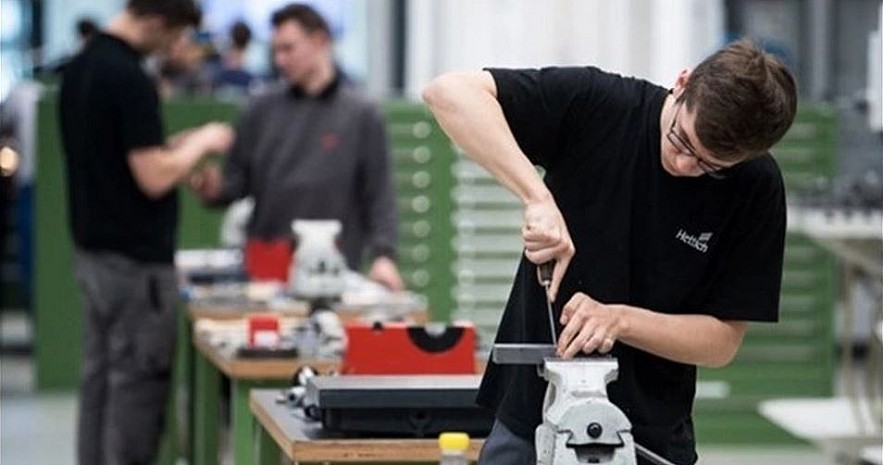Vocational Training in Germany: One Solution, Dual Successes
Humanistic vision
Students study and work at the same time, receiving a net pay of about EUR 700-900/month - just enough for living expenses. At the end of the 2-3 year apprenticeship program, students will have a professional degree and be able to apply for a full-time job with a decent salary compared to the average level in European countries. Theoretical knowledge is immediately applied in practical sessions at the service facility. Students will understand how businesses operate and have a practical basis for the profession they are being trained for.
With about 325 recognized vocational training types in Germany, students can easily find a training course that they desire and that suits their abilities. The professions that most people choose to study are sales, hotel and restaurant operations, medical care, and beauty. The form of studying while working gives students a good opportunity to get a job immediately. About 2/3 of German students choose parallel vocational training. Several practical universities were also newly established and had students studying immediately.
During a visit to the new training facility of the Berlin Transport Company, German Prime Minister Olaf Scholz emphasized the importance of vocational training for each individual and the future of the entire country. The method of studying while working for several years is effectively applied to have enough young human resources with high qualifications.
According to Prime Minister Olaf Scholz, it is significant to convince many young people to pursue vocational training because "vocational training is extremely important for Germany," and it is also important to attract foreign youth.
 |
| Students in Germany spent 1/3 of their time learning theoretical instruction, and the rest working at factories. |
Expanding training scale
Currently, 40% of German training-licensed businesses have recruited students from other countries for vocational training, according to a survey by the Association of German Chambers of Industry and Commerce. The number of foreign students has also increased significantly compared to previous years.
The main reason is that there are too many training quotas, especially in handicraft industries such as confectionery, food processing, construction, mechanics, animal husbandry, and farming. By mid-2023, there were about 250,000 vocational training targets that could not find students for many reasons, while 137,000 students were looking for suitable vocational training positions.
Therefore, businesses and vocational schools are urgently looking for new training human resources from abroad, especially from developing countries. Vocational training regulations have relaxed and authority agencies have quickly issued vocational visas to qualified cases (with B1 German proficiency, at least 18 years old, with an apprenticeship contract at a licensed training facility).
Opportunities for Vietnamese
Many establishments in Vietnam have signed cooperation contracts to bring vocational students to Germany under a parallel vocational training program. In an interview with the national television channel ZDF, Thao Tran, currently studying and working at a bread and pastry company in Thuringia state, excitedly said: "I find this training method very interesting, and I want to stay in Germany to work and study”.
Nguyen Viet, 20 years old, from Ho Chi Minh City, was determined to study the 1-year German B1 course in Hanoi. He came to Berlin in early 2023 to study and work in an Asian kitchen. He was very satisfied because he had a place to practice at a Vietnamese restaurant which is near his relatives.
Le Phuong, 30 years old, a nurse in Vinh, proactively studied and took the B2 German exam to apply to study nursing in Berlin. After graduating, she immediately found a full-time and well-paid job. The entrance to the parallel vocational training program in Germany is not easy, requiring students to have good knowledge of German, but with diligence and seriousness in the learning and practice process, almost all vocational students have a satisfactory life in Germany.
 | Vietnam-UK Education Cooperation Enhanced In April 2022, the two sides signed a memorandum of understanding (MoU) on the legal framework for educational cooperation between the two countries with a ... |
 | Lao Cai, New Zealand to Cooperate on Human Resources Training Lao Cai northern province signed a vocational training agreement with New Zealand. |
 | Ca Mau Students Receive Free Training in Germany Ca Mau students when participating in a vocational program in Germany not only receive free training but also get a support of more than VND ... |
Recommended
 World
World
India reports 9 Pakistani Aircraft Destroyed In Operation Sindoor Strikes
 World
World
Thailand Positions Itself As a Global Wellness Destination
 World
World
Indonesia Accelerates Procedures to Join OECD
 World
World
South Korea elects Lee Jae-myung president
Popular article
 World
World
22nd Shangri-La Dialogue: Japan, Philippines boost defence cooperation
 World
World
Pakistan NCRC report explores emerging child rights issues
 World
World
"India has right to defend herself against terror," says German Foreign Minister, endorses Op Sindoor
 World
World







